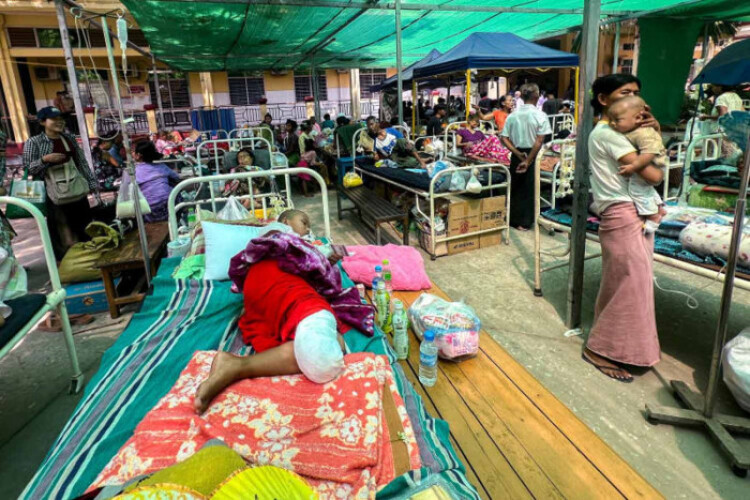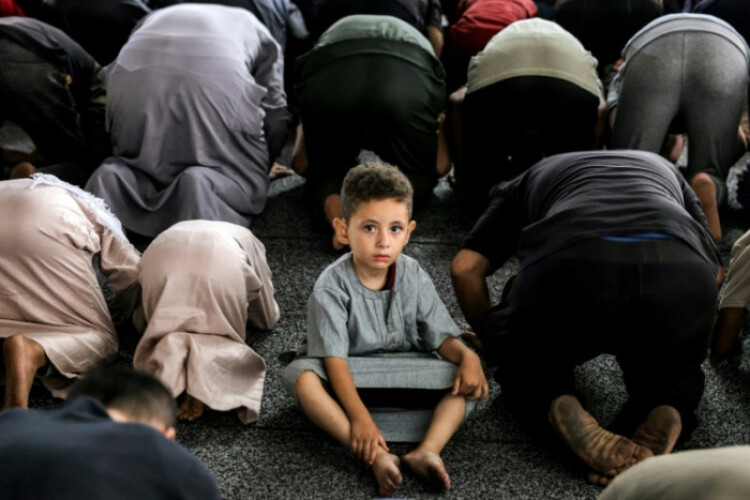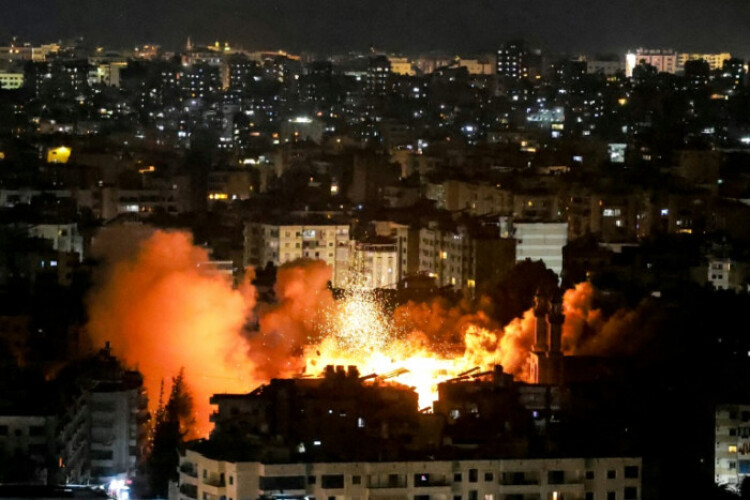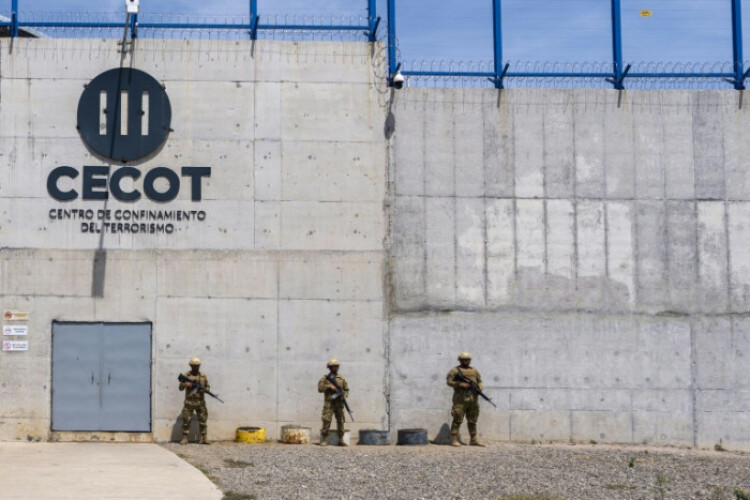
Myanmar’s military on Wednesday announced a unilateral ceasefire in its fight against rebels until April 22 to expedite relief and reconstruction efforts after last week’s devastating earthquake, which has killed more than 3,000 people.
The office of the commander-in-chief also said it would “take necessary countermeasures” during that time if opposition groups sought to damage communication lines, mobilize forces or take new territory.
Junta chief Min Aung Hlaing had earlier rejected ceasefire proposals from rebel groups seeking to facilitate aid to areas impacted by the earthquake amid concerns that the conflict was hindering relief efforts.
The move offers a potential brief reprieve from fighting that reignited four years ago after the military seized control of much of the nation in a coup. Even as damage from the 7.7 magnitude quake was still being assessed, pro-democracy rebel groups reported fresh military airstrikes Friday in areas close to the epicenter.
Myanmar on Wednesday reported 3,003 deaths, 4,515 injuries and 351 missing due to the earthquake and aftershocks, according to the State Administration Council.
Amid the turmoil in Myanmar, military leader Min Aung Hlaing plans to attend a regional economic summit in person in Bangkok on Friday, a rare trip to a neighboring Southeast Asian country since the junta took power. Indian Prime Minister Narendra Modi is also expected at the summit.
Earlier on Wednesday, the military said it fired “warning shots” at a vehicle convoy from the Red Cross Society of China bringing aid to quake victims.
The convoy of nine vehicles bound for Mandalay was approached by military security forces in a northern town where clashes were ongoing with an opposing ethnic armed group, a junta official said Wednesday. The troops then attempted to halt the vehicles, after the relief group apparently failed to notify authorities of its movements.
“We attempted to stop the convoy, but they refused to stop,” said the ruling State Administration Council’s spokesman Major General Zaw Min Tun. “After that, we fired warning shots from about 100 meters away, and we understand they fled back.” There were no casualties or damage, he said.
There was no immediate comment from the Red Cross Society of China. China is Myanmar’s biggest trading partner and has played a key role in mediating ceasefire talks for the regime, which has been criticized by many western democracies and sanctioned by the US.
An earlier account from the Ta’ang National Liberation Army said the junta opened fire on the convoy, although the rebel group didn’t say whether there was any damage.
Chinese Foreign Ministry spokesman Guo Jiakun told reporters at a regular news briefing in Beijing that the rescue team and supplies are safe, but didn’t confirm the incident.
Ceasefire Efforts
A pro-democracy shadow government allied to detained civilian leader Aung San Suu Kyi declared a two-week ceasefire following the quake. With the death toll likely to grow, another alliance of rebel groups that had made substantial territorial gains against the military also announced it would not initiate offensive operations for a month.
Lway Yay Oo, spokeswoman of the northern-based Ta’ang National Liberation Army, said three bombings have occurred since the earthquake, causing injuries and destroying residential buildings. “They are committing inhumane acts, like always,” she said.
Min Aung Hlaing said his military hasn’t conducted operations on enemy camps, but has responded when it was attacked.
The bombing run Friday drew condemnation from the United Nations and rights groups, with Amnesty International saying it’s added “to the strain of recovery efforts and the fear and anxiety of survivors.”
For now, the military is tightly managing access to the areas it controls that sustained heavy damage, including Naypyidaw and Mandalay, a city of over a million people.
“This is an indication of how weak his regime and military are at this juncture,” said Richard Horsey, a senior adviser at Crisis Group.
“They are mostly in defensive mode, trying to prevent their positions being overrun, and even where they are on the offensive, the aim is most often limited to establishing more readily defendable positions.”
The office of the commander-in-chief also said it would “take necessary countermeasures” during that time if opposition groups sought to damage communication lines, mobilize forces or take new territory.
Junta chief Min Aung Hlaing had earlier rejected ceasefire proposals from rebel groups seeking to facilitate aid to areas impacted by the earthquake amid concerns that the conflict was hindering relief efforts.
The move offers a potential brief reprieve from fighting that reignited four years ago after the military seized control of much of the nation in a coup. Even as damage from the 7.7 magnitude quake was still being assessed, pro-democracy rebel groups reported fresh military airstrikes Friday in areas close to the epicenter.
Myanmar on Wednesday reported 3,003 deaths, 4,515 injuries and 351 missing due to the earthquake and aftershocks, according to the State Administration Council.
Amid the turmoil in Myanmar, military leader Min Aung Hlaing plans to attend a regional economic summit in person in Bangkok on Friday, a rare trip to a neighboring Southeast Asian country since the junta took power. Indian Prime Minister Narendra Modi is also expected at the summit.
Earlier on Wednesday, the military said it fired “warning shots” at a vehicle convoy from the Red Cross Society of China bringing aid to quake victims.
The convoy of nine vehicles bound for Mandalay was approached by military security forces in a northern town where clashes were ongoing with an opposing ethnic armed group, a junta official said Wednesday. The troops then attempted to halt the vehicles, after the relief group apparently failed to notify authorities of its movements.
“We attempted to stop the convoy, but they refused to stop,” said the ruling State Administration Council’s spokesman Major General Zaw Min Tun. “After that, we fired warning shots from about 100 meters away, and we understand they fled back.” There were no casualties or damage, he said.
There was no immediate comment from the Red Cross Society of China. China is Myanmar’s biggest trading partner and has played a key role in mediating ceasefire talks for the regime, which has been criticized by many western democracies and sanctioned by the US.
An earlier account from the Ta’ang National Liberation Army said the junta opened fire on the convoy, although the rebel group didn’t say whether there was any damage.
Chinese Foreign Ministry spokesman Guo Jiakun told reporters at a regular news briefing in Beijing that the rescue team and supplies are safe, but didn’t confirm the incident.
Ceasefire Efforts
A pro-democracy shadow government allied to detained civilian leader Aung San Suu Kyi declared a two-week ceasefire following the quake. With the death toll likely to grow, another alliance of rebel groups that had made substantial territorial gains against the military also announced it would not initiate offensive operations for a month.
Lway Yay Oo, spokeswoman of the northern-based Ta’ang National Liberation Army, said three bombings have occurred since the earthquake, causing injuries and destroying residential buildings. “They are committing inhumane acts, like always,” she said.
Min Aung Hlaing said his military hasn’t conducted operations on enemy camps, but has responded when it was attacked.
The bombing run Friday drew condemnation from the United Nations and rights groups, with Amnesty International saying it’s added “to the strain of recovery efforts and the fear and anxiety of survivors.”
For now, the military is tightly managing access to the areas it controls that sustained heavy damage, including Naypyidaw and Mandalay, a city of over a million people.
“This is an indication of how weak his regime and military are at this juncture,” said Richard Horsey, a senior adviser at Crisis Group.
“They are mostly in defensive mode, trying to prevent their positions being overrun, and even where they are on the offensive, the aim is most often limited to establishing more readily defendable positions.”










